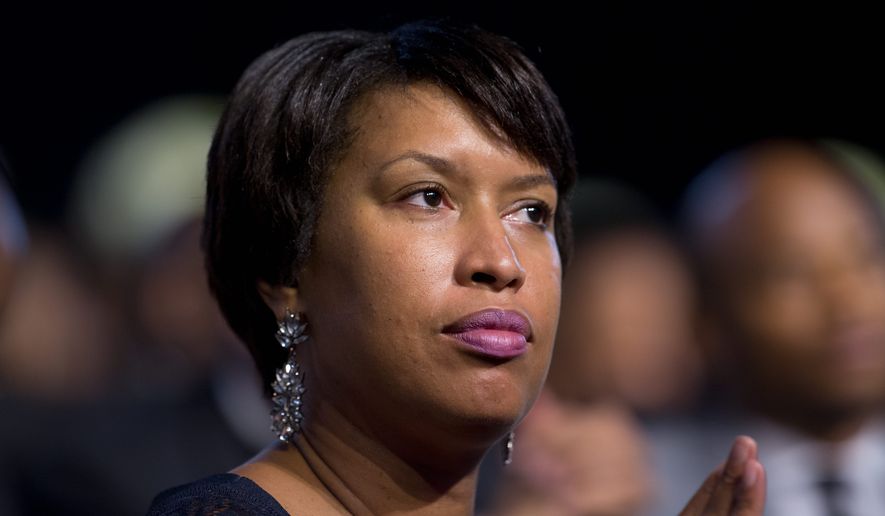As D.C. Mayor Muriel Bowser mingles with Hollywood celebrities to push statehood at the Democratic National Convention, some lifelong statehood activists in the District are wondering what happened to their grass-roots movement.
One thing Ms. Bowser and the advocates from first major statehood push in 1982 have in common is the goal to have D.C. voters fully represented in Congress. But for those who started in ’82, the process has changed — and not necessarily for the better.
“There’s no room for citizens in this process,” said Howard Croft, an elected delegate to the District’s 1982 constitutional convention. “What’s been driving the mayor is the argument that you just have to get something over there and write it in a way that’s acceptable to Congress. State constitutions should be drafted in a way that reflects resident values.”
Mr. Croft said the process in 1982 was extended more than a year and a half to ensure residents were part of the process.
“It was all done by the people,” statehood veteran Ann Loikow said of the ’82 movement. “We believed so strongly of the rights of the people. It was from the people up. This one has come from an initiative by the mayor that has been strictly controlled by the mayor and [D.C.] Council Chairman Phil Mendelson. It’s totally been top-down.”
Ms. Bowser, a Democrat, launched a statehood campaign this year with a call to start the process of convening a constitutional convention and drafting a founding document.
The mayor has said the process is moving quickly because a constitution must be ready if Democrats win the White House or gain control of Congress in November’s elections.
“Washington, D.C., pays more federal taxes per person than any state and more gross taxes than 22 states. But we have no vote in the House and no voice at all in the Senate. The time for statehood is now,” Ms. Bowser said in a statement to The Washington Times.
At the Democratic convention in Philadelphia this week, the Creative Coalition, a political nonprofit started by actor Ron Silver in 1989, will host a statehood party featuring Ms. Bowser and actors Elizabeth Banks, Tim Daly, Josh Gad, Ashley Judd and David Schwimmer.
A 40-page draft of the Democratic platform offers a single line saying party leaders will push for D.C. statehood, and presidential candidate Hillary Clinton has vowed to be a “vocal champion” of statehood.
Though D.C. officials released a draft constitution this month, it’s unclear whether the D.C. Council will be able to approve its language for a referendum before the November elections. The legislative body returns from recess in mid-September and would need to schedule two votes to pass the measure. If it fails, city residents would be in the awkward position of voting for a constitution that could change after the election.
The referendum would ask voters if the city should become a state, if they approve of a constitution, if they approve the state’s proposed boundaries and if they support a representative form of state government.
In June, the New Columbia Statehood Commission, an independent D.C. agency created in 2014, approved a draft constitution as a template if the city becomes the 51st state. The commission consists of Ms. Bowser, Mr. Mendelson, “shadow” representative Franklin Garcia and “shadow” senators Michael Brown and Paul Strauss.
It approved the draft after a three-day constitutional convention with no elected delegates. Instead, Ms. Bowser said, residents could be “delegates” by offering their opinions in testimony during the three-day meeting.
The process bears no resemblance to the 1982 movement.
“People had to campaign and put forth a platform,” Mr. Croft said. “The elected delegates were accountable to residents of each ward. We had a process that came from the grass roots.”
A constitutional convention was held for 90 legislative days, with several committees on different issues holding meetings and hearings for the public, he said. Voters then ratified the constitution. The 40 elected delegates “were accountable to residents of each ward,” Mr. Croft said.
“The people who got elected were a real cross-section of the city,” Ms. Loikow said.
The U.S. Constitution requires the federal government to operate from a sovereign “district.” Republicans have long opposed creating a state from the predominantly Democratic District of Columbia.
• Ryan M. McDermott can be reached at rmcdermott@washingtontimes.com.




Please read our comment policy before commenting.